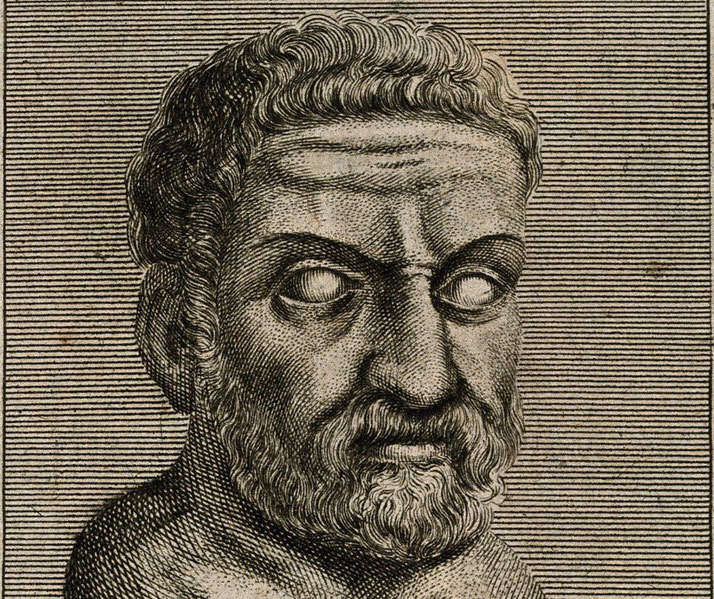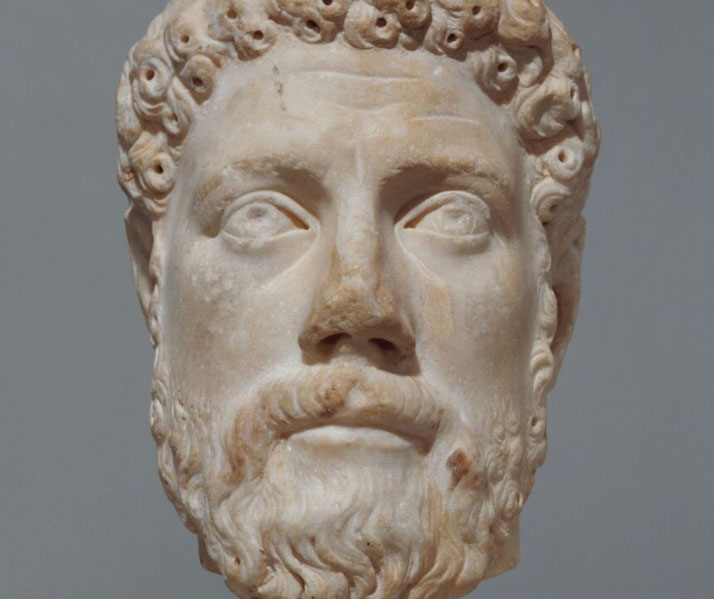Who were the Seven Sages of ancient Greece?

In ancient Greece, there was a group known as the Seven Sages. These eminent men, each a luminary in his own right, were renowned for their wisdom, leadership, and contributions to early Western thought.
Hailing from various city-states across ancient Greece, they were the epitome of the Greek ideal of "arête," or excellence, in both thought and action.
Their teachings, often distilled into succinct maxims, were inscribed in the Temple of Apollo at Delphi, the most sacred site in ancient Greece.
These inscriptions served not just as guidelines for personal conduct, but also as foundational principles that influenced Greek law, governance, and philosophy.
When did the Seven Sages live?
The Seven Sages of Ancient Greece emerged during a period of profound transformation and intellectual ferment.
The 7th and 6th centuries BCE were marked by the rise of the polis, the Greek city-state, which became the fundamental political and social unit of ancient Greece.
These city-states were fiercely independent, each governed by its own set of laws and customs, yet they shared a common language, religion, and cultural heritage.
It was a time when the oral traditions of the past were giving way to written laws and codified systems of governance, setting the stage for the democratic ideals that would later flourish in places like Athens.
This era was not just a time of political evolution; it was also a crucible of intellectual and philosophical inquiry.
The concept of "arête," or excellence, was deeply ingrained in the Greek psyche, driving individuals to strive for perfection in various fields, from athletics and warfare to poetry and philosophy.
The Seven Sages were products of this intellectual milieu, and their wisdom was seen as a practical guide to achieving excellence in public and private life.
They were polymaths in the truest sense, contributing to a wide range of disciplines including ethics, politics, law, and even mathematics and natural philosophy.
However, the Greece of the 6th and 7th centuries BCE was also a land fraught with conflict and social strife.
The emergence of the polis led to territorial disputes, economic competition, and, at times, open warfare between city-states.
It was a period that demanded strong leadership and wise governance, qualities embodied by the Seven Sages.
Each in his own way grappled with the challenges of his time, whether it was Solon's efforts to alleviate social inequality in Athens or Chilon's role in maintaining the military discipline for which Sparta was famous.
Their wisdom was often sought in matters of statecraft, diplomacy, and law, and their influence extended beyond their home cities to the broader Greek world.
1. Solon of Athens
Solon of Athens stands as one of the most influential figures not only among the Seven Sages but also in the annals of Western history.
Born into a well-off Athenian family, Solon quickly rose to prominence due to his wisdom, eloquence, and commitment to justice.
His ascent to power came at a critical juncture in Athenian history, a time when the city-state was mired in social and economic turmoil.
The gap between the rich and the poor had widened to an unsustainable degree, and the threat of civil unrest loomed large.
It was in this crucible of inequality and tension that Solon was appointed Archon, or chief magistrate, of Athens in 594 BCE, tasked with the formidable challenge of reforming the Athenian legal system.
Solon's reforms were nothing short of revolutionary. He abolished the Draconian laws that had previously been in place, laws that were so harsh they were said to be written in blood.
In their stead, he implemented a series of legal codes designed to level the playing field and give the common people a voice in governance.
Among his most notable reforms was the cancellation of debts and the emancipation of Athenians who had been enslaved due to debt.
These measures were not merely acts of social justice; they were pragmatic solutions aimed at preserving the social fabric of Athens.
Solon understood that a society divided against itself could not stand, and his laws were crafted to foster unity and mutual respect among the citizenry.

2. Chilon of Sparta
Chilon of Sparta, another luminary among the Seven Sages, offers a contrasting yet complementary perspective to the Athenian ethos embodied by Solon.
As a prominent Spartan and a member of the Spartan Senate, Chilon's life and teachings were deeply influenced by the unique social and political landscape of Sparta, a city-state renowned for its military prowess and austere lifestyle.
Unlike Athens, which was moving towards democracy and open debate, Sparta was a rigid oligarchy, focused on discipline, hierarchy, and martial excellence.
It was in this environment that Chilon rose to prominence, not just as a politician but also as a moral philosopher whose maxims and sayings were aimed at reinforcing the Spartan way of life.
Chilon's influence was not limited to the realm of philosophy; he was also a key figure in Spartan politics.
He was credited with strengthening the ephorate, a council of five elected officials who wielded significant power in Spartan governance.
This political body served as a counterbalance to the dual kingship that ruled Sparta, ensuring that no single entity had unchecked authority.
Chilon's contributions to the ephorate were in line with his broader philosophy of balance and moderation, principles that were encapsulated in another of his famous maxims: "Do not desire the impossible."
For Chilon, the stability and strength of Sparta lay in its balanced system of governance, where power was distributed and checked by various institutions.

3. Thales of Miletus
Born in the city-state of Miletus, a bustling center of commerce and culture in Ionia, Thales was exposed to a diverse array of ideas and philosophies from an early age.
Unlike Solon's focus on law and governance or Chilon's emphasis on social discipline, Thales is best remembered for his contributions to natural philosophy, what we would today call science.
He was among the first to propose that natural phenomena could be explained by principles that were both universal and discoverable, a radical departure from the prevailing view that attributed such phenomena to the whims of gods.
Thales' most famous assertion was that water is the fundamental substance of all things.
While this idea may seem simplistic to modern readers, it was groundbreaking in its time.
By suggesting that a single element could be the basis for all matter, Thales introduced the concept of a unifying principle underlying the complexity of the natural world.
This was not just idle speculation; Thales was known for applying his theories in practical ways.
He is credited with several innovations in geometry and astronomy, including the prediction of a solar eclipse.
His ability to apply abstract principles to solve concrete problems exemplifies the essence of his wisdom: a blend of theoretical insight and practical ingenuity.

4. Bias of Priene
Hailing from the city-state of Priene in Ionia, Bias was renowned for his sense of justice and moral integrity.
Unlike Thales, who was more focused on natural philosophy, or Solon and Chilon, who were deeply involved in governance, Bias was primarily celebrated for his ethical teachings and his ability to resolve disputes.
In a society where oral tradition and storytelling were the primary means of imparting wisdom, Bias was a master orator whose words were said to "charm and calm the soul."
Bias was often called upon to adjudicate in complex legal cases, and his judgments were known for their fairness and wisdom.
One of his most famous sayings, "Most men are bad," may sound cynical at first glance, but it encapsulates a deeper understanding of human nature and the complexities of morality.
Bias recognized the fallibility of human beings and the challenges that come with it, especially in matters of justice and governance.
His wisdom lay in his ability to navigate these complexities in a way that upheld the principles of fairness and equity.
He was not just a dispenser of justice but also a teacher who used his role to impart ethical and moral lessons to his fellow citizens.
5. Cleobulus of Lindos
Cleobulus of Lindos hailed from the island of Rhodes, specifically from the city of Lindos.
Known for his physical strength and striking beauty, Cleobulus was more than just a handsome face; he was a philosopher, statesman, and a man of letters.
Unlike his fellow sages who were deeply involved in the political and judicial systems of their respective city-states, Cleobulus was a tyrant of Lindos.
However, his rule was noted for its moderation and wisdom, making him a beloved leader.
His governance was imbued with a sense of balance, a principle that also found expression in his most famous maxim: "Moderation is the best thing."
Cleobulus' emphasis on moderation was not just a guiding principle for his rule; it was a holistic philosophy that extended to all aspects of life.
He was known for his riddles and poetry, through which he often imparted lessons of balance and moderation.
These were not just idle pastimes but educational tools aimed at stimulating the intellect and nurturing moral virtues among his people.
Cleobulus believed that wisdom was not merely an intellectual exercise but a way of living that required the harmonious development of body, mind, and soul.
This holistic approach to wisdom was evident in his governance, which sought to create a society where people could thrive both materially and spiritually.
6. Pittacus of Mytilene
Pittacus of Mytilene was not just a thinker but also a man of action. He gained fame as a military leader, particularly for his role in defending Mytilene against the Athenians.
His tactical brilliance on the battlefield was matched only by his wisdom in governance, as he later served as a ruler of Mytilene and enacted a series of reforms aimed at creating a more just and equitable society.
One of his most famous maxims, "Know the right moment," encapsulates his philosophy of timely action, whether in war or politics.
Pittacus' tenure as a ruler was marked by a focus on social justice and legal reform. He is credited with introducing a law that imposed harsher penalties on those who committed crimes under the influence of alcohol.
This law was not just a punitive measure but a reflection of his broader philosophy that emphasized personal responsibility and ethical conduct.
Pittacus believed that the stability of a society rested on the moral integrity of its citizens, and his laws were designed to cultivate this virtue.
His governance was not about consolidating power but about creating an environment where justice and fairness prevailed.
This approach to leadership was encapsulated in another of his sayings: "It is hard to be good."
7. Periander of Corinth
Periander of Corinth is perhaps the most controversial figure among the Seven Sages of Ancient Greece.
Unlike his fellow sages, who were largely celebrated for their wisdom and just rule, Periander was a tyrant whose governance was marked by both enlightened policies and harsh measures.
Ruling over the strategically located city-state of Corinth, he inherited a position of considerable power and influence.
Under his rule, Corinth flourished as a center of commerce and culture, benefiting from its advantageous position between two seas.
Yet, his reign was also characterized by authoritarian measures aimed at consolidating his power.
One of his most famous maxims, "Forethought in all things," captures the essence of his calculated approach to governance.
Periander's rule was a study in contrasts. On one hand, he was a patron of the arts and sciences, inviting intellectuals and artists to his court and fostering an environment where culture could thrive.
He was credited with the construction of significant architectural projects, including temples and marketplaces that added to the grandeur of Corinth.
On the other hand, he was known for his despotic tendencies, including the suppression of the nobility and the imposition of heavy taxes.
Yet, even these measures were implemented with a certain wisdom and foresight, aimed at maintaining the stability and prosperity of Corinth.
His ability to balance between tyranny and enlightenment made him a subject of both admiration and criticism, a ruler who defied easy categorization.

Recording the famous sayings of the Sages
Nestled amidst the rugged terrains of Mount Parnassus, the Temple of Delphi was the spiritual heart of ancient Greece, a place where kings, warriors, and commoners alike sought guidance from the Oracle.
The Oracle, believed to be the mouthpiece of Apollo, the god of prophecy, offered cryptic yet insightful answers to a wide range of questions, from matters of statecraft to personal dilemmas.
But the temple was not just a place of prophecy; it was also a repository of wisdom, as evidenced by the inscriptions of the maxims of the Seven Sages on its walls.
The decision to inscribe the maxims of the Seven Sages in the Temple of Apollo was a significant one, elevating their wisdom to the realm of the divine.
These inscriptions served as moral and ethical guideposts for those who visited the temple.
Phrases like "Know Thyself" and "Nothing in Excess" were more than just pithy sayings; they were foundational principles that encapsulated the essence of Greek philosophy and ethics.
These maxims, etched in stone, served as a constant reminder of the enduring values that underpinned Greek society, values that were as relevant to the individual pilgrim as they were to the statesmen and rulers who sought the Oracle's counsel.
The relevance of the Seven Sages today
The legacy of these maxims is not confined to the Western world. Their universal appeal lies in their ability to address fundamental human concerns that are as relevant today as they were in ancient Greece.
Whether it's the challenge of self-governance, the complexities of social justice, or the eternal quest for knowledge, these maxims offer timeless insights that speak to the human condition.
They have been cited in religious texts, incorporated into legal codes, and taught in educational institutions, serving as ethical guideposts for diverse cultures and societies.
In a world that is increasingly complex and fraught with challenges, the maxims of the Seven Sages offer a touchstone of wisdom that can guide us through the labyrinth of modern existence.
They remind us that despite the advances in technology and the complexities of contemporary life, the fundamental challenges of human existence remain largely unchanged.
The quest for a virtuous life, the pursuit of knowledge, and the complexities of human governance are eternal themes that continue to engage and challenge us.
What do you need help with?
Download ready-to-use digital learning resources
Copyright © History Skills 2014-2025.
Contact via email
With the exception of links to external sites, some historical sources and extracts from specific publications, all content on this website is copyrighted by History Skills. This content may not be copied, republished or redistributed without written permission from the website creator. Please use the Contact page to obtain relevant permission.





